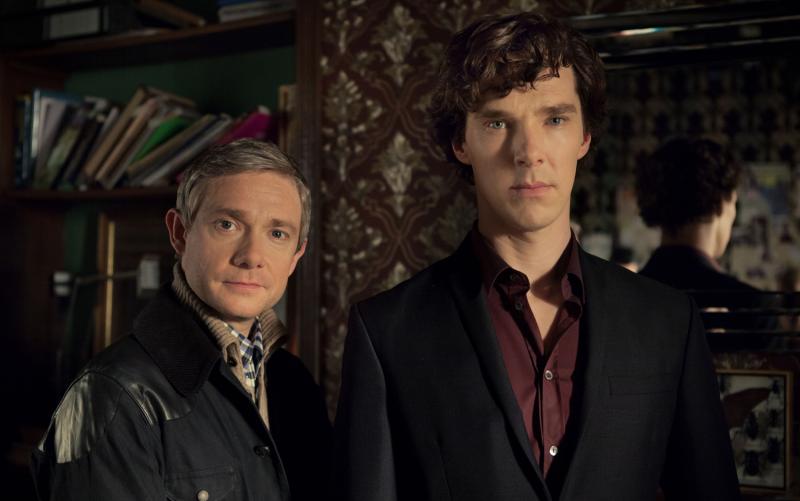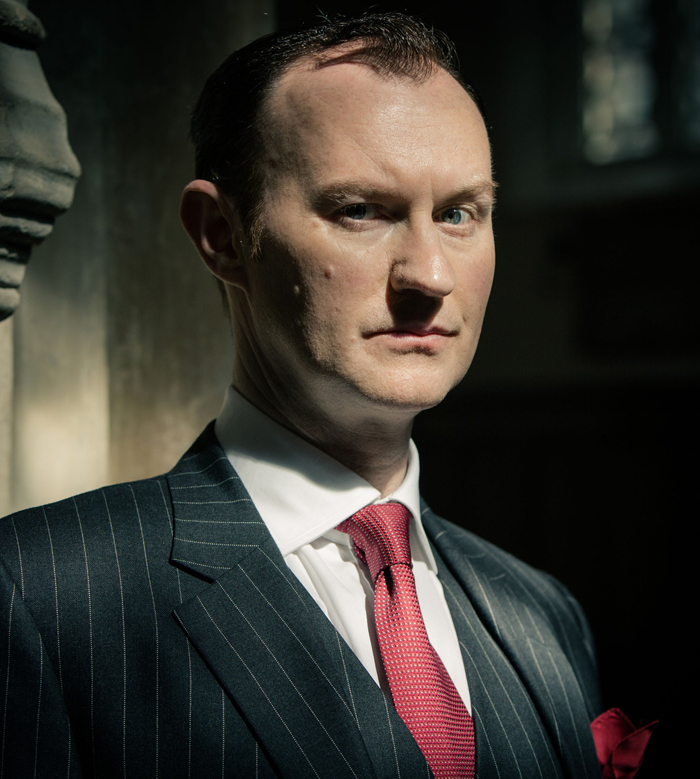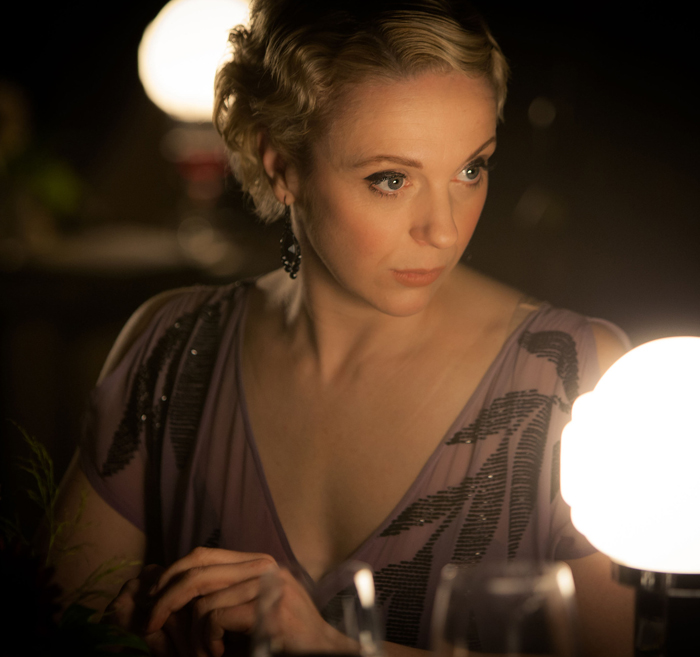Sherlock, Series 3, BBC One | reviews, news & interviews
Sherlock, Series 3, BBC One
Sherlock, Series 3, BBC One
All present and correct - fiendish cleverness, conspiracy theories and sparkling wordplay

In our big-bang globalised environment, Sherlock Holmes is now more like a Marvel Comics superhero than a mere "consulting detective".
Happily, Mark Gatiss (who wrote this series three opener) is canny enough to recognise the value of wit to humanise the cascading cleverness, and even amid the quicksilver torrent of tricks and feints he made sure that the Holmes-Watson relationship continued to strike sparks. Much - possibly a little too much - time was allotted to Watson's coming to terms with Holmes's return from the apparent dead (he was particularly miffed that the select handful of people in on the secret hadn't included him), but the chippy, bantering rapport between Benedict Cumberbatch's mercurial Sherlock and Martin Freeman's stolid Doc is among the best in the long history of their screen incarnations. Clever-clogs Sherlock getting a head-butt and a bloody nose from his exasperated assistant seemed only reasonable.
 Gatiss (pictured as Mycroft Holmes) had evidently burned wallet-piercing quantities of midnight oil over the feverishly-debated issue of how Sherlock had survived the long drop off the roof of Barts hospital onto the unforgiving pavement below at the end of the last series. Cunningly, he gave himself extra wiggle room by supplying the solution in binary form. First there was a kind of touristic version, involving rubber masks, bungee-jumping and a guest appearance by Derren Brown. We saw this one being relayed to DI Lestrade (an endearingly dog-eared Rupert Graves) by conspiracy nerd and Holmes swot Phillip Anderson (Jonathan Aris, in need of a good bath). Lestrade's reaction - "Bollocks!" - will have struck a popular chord, I think.
Gatiss (pictured as Mycroft Holmes) had evidently burned wallet-piercing quantities of midnight oil over the feverishly-debated issue of how Sherlock had survived the long drop off the roof of Barts hospital onto the unforgiving pavement below at the end of the last series. Cunningly, he gave himself extra wiggle room by supplying the solution in binary form. First there was a kind of touristic version, involving rubber masks, bungee-jumping and a guest appearance by Derren Brown. We saw this one being relayed to DI Lestrade (an endearingly dog-eared Rupert Graves) by conspiracy nerd and Holmes swot Phillip Anderson (Jonathan Aris, in need of a good bath). Lestrade's reaction - "Bollocks!" - will have struck a popular chord, I think.
Reminder: what happened in the finale to Sherlock series two
Sherlock Holmes on theartsdesk
Version two came from Sherlock himself, and was delivered to a salivating Anderson with smirking triumphalism by the too-clever 'tec. I shan't bore you with the details - you can look 'em up on iPlayer - but Sherlock couldn't conceal his displeasure when Anderson declared himself "disappointed" with the explanation. "Hmmph, everyone's a critic," grunted Holmes. So there we had it - two explanations, each of them nearly as trustworthy as a politician's election promise.
 It was excellent sport of course, though all this restitching of the narrative fabric - we also had the reintroduction of Una Stubbs as landlady Mrs Hudson and the arrival of Amanda Abbington (pictured left) as Watson's fiancée, Mary - meant that the episode (albeit lasting 90 minutes) had to get its skates on to fit in a bit of new plot. This involved Sherlock being captured and horridly tortured in some Balkan hellhole, then, thanks to an intervention by his super-competitive brother Mycroft (Gatiss himself), whisked back to London to foil a fiendish plot by an "underground network". Since we're in the wordplay business here, underground turned out to mean Underground, featuring an explosive-crammed tube carriage designed to pick up where Guy Fawkes got off.
It was excellent sport of course, though all this restitching of the narrative fabric - we also had the reintroduction of Una Stubbs as landlady Mrs Hudson and the arrival of Amanda Abbington (pictured left) as Watson's fiancée, Mary - meant that the episode (albeit lasting 90 minutes) had to get its skates on to fit in a bit of new plot. This involved Sherlock being captured and horridly tortured in some Balkan hellhole, then, thanks to an intervention by his super-competitive brother Mycroft (Gatiss himself), whisked back to London to foil a fiendish plot by an "underground network". Since we're in the wordplay business here, underground turned out to mean Underground, featuring an explosive-crammed tube carriage designed to pick up where Guy Fawkes got off.
The closing seconds offered an oblique glimpse of new villain Charles Augustus Magnussen, played by familiar Danish actor Lars Mikkelsen (Katrine's new boyfriend in the last Borgen). All, or at least a bit more, will be revealed over the next couple of Sundays.
rating
Explore topics
Share this article
Add comment
Subscribe to theartsdesk.com
Thank you for continuing to read our work on theartsdesk.com. For unlimited access to every article in its entirety, including our archive of more than 15,000 pieces, we're asking for £5 per month or £40 per year. We feel it's a very good deal, and hope you do too.
To take a subscription now simply click here.
And if you're looking for that extra gift for a friend or family member, why not treat them to a theartsdesk.com gift subscription?
more TV
 Lady in the Lake, Apple TV+ review - a multi-layered Baltimore murder mystery
Natalie Portman stars in screen adaptation of Laura Lippman's novel
Lady in the Lake, Apple TV+ review - a multi-layered Baltimore murder mystery
Natalie Portman stars in screen adaptation of Laura Lippman's novel
 The Jetty, BBC One review - lowlife in a Northern town
Jenna Coleman stars in a dark tale of abuse and exploitation
The Jetty, BBC One review - lowlife in a Northern town
Jenna Coleman stars in a dark tale of abuse and exploitation
 The Turkish Detective, BBC Two review - a bad business in the Bosphorus
Barbara Nadel's Inspector Ikmen novels reach the screen
The Turkish Detective, BBC Two review - a bad business in the Bosphorus
Barbara Nadel's Inspector Ikmen novels reach the screen
 The Night Caller, Channel 5 review - all he hears is radio ga ga
Robert Glenister and Sean Pertwee star in smartly-written thriller
The Night Caller, Channel 5 review - all he hears is radio ga ga
Robert Glenister and Sean Pertwee star in smartly-written thriller
 I Am: Celine Dion, Prime Video review - inside the superstar singer's living hell
Shattering documentary makes agonising viewing
I Am: Celine Dion, Prime Video review - inside the superstar singer's living hell
Shattering documentary makes agonising viewing
 theartsdesk Q&A: Lucie Shorthouse is flying high with 'We Are Lady Parts' and 'Rebus'
An actor's progress from Cambridge Footlights to 'Everybody's Talking About Jamie', a female Muslim punk band and crime-fighting in Edinburgh
theartsdesk Q&A: Lucie Shorthouse is flying high with 'We Are Lady Parts' and 'Rebus'
An actor's progress from Cambridge Footlights to 'Everybody's Talking About Jamie', a female Muslim punk band and crime-fighting in Edinburgh
 Presumed Innocent, Apple TV+ review - you read the book and saw the movie...
Jake Gyllenhaal stars in absorbing TV adaptation of Scott Turow's legal thriller
Presumed Innocent, Apple TV+ review - you read the book and saw the movie...
Jake Gyllenhaal stars in absorbing TV adaptation of Scott Turow's legal thriller
 Eric, Netflix review - a fairytale of New York
Abi Morgan's drama is a strange mix of urban grime and magic realism
Eric, Netflix review - a fairytale of New York
Abi Morgan's drama is a strange mix of urban grime and magic realism
 theartsdesk Q&A: Matthew Modine on 'Hard Miles', 40 years in showbusiness and safer cycling
An eventful journey from 'Full Metal Jacket' to 'Oppenheimer' and 'Stranger Things'
theartsdesk Q&A: Matthew Modine on 'Hard Miles', 40 years in showbusiness and safer cycling
An eventful journey from 'Full Metal Jacket' to 'Oppenheimer' and 'Stranger Things'
 Tokyo Vice, Series 2, BBC iPlayer review - an exciting ride that stretches credibility
The return of Jake Adelstein, ace reporter
Tokyo Vice, Series 2, BBC iPlayer review - an exciting ride that stretches credibility
The return of Jake Adelstein, ace reporter
 The Beach Boys, Disney+ review - heroes and villains and good vibrations
Stylish retelling of the Beach Boys saga could use sharper teeth
The Beach Boys, Disney+ review - heroes and villains and good vibrations
Stylish retelling of the Beach Boys saga could use sharper teeth
 theartsdesk Q&A: Eddie Marsan and the American Revolution, posh boys and East End gangsters
Versatile actor on playing John Adams opposite Michael Douglas in Apple TV+’s ‘Franklin'
theartsdesk Q&A: Eddie Marsan and the American Revolution, posh boys and East End gangsters
Versatile actor on playing John Adams opposite Michael Douglas in Apple TV+’s ‘Franklin'

Comments
There was too much pressure
is this programme aimed at